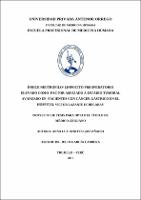| dc.contributor.advisor | García Cabrera, Julio | |
| dc.contributor.author | Benites Gastañadui, Anna Luz | |
| dc.creator | Benites Gastañadui, Anna Luz | |
| dc.date.accessioned | 2016-01-22T23:09:41Z | |
| dc.date.available | 2016-01-22T23:09:41Z | |
| dc.date.issued | 2015 | |
| dc.identifier.uri | https://hdl.handle.net/20.500.12759/1314 | |
| dc.description.abstract | Determinar si el índice neutrófilo/ linfocito preoperatorio elevado está asociado a estadío tumoral avanzado en pacientes con cáncer gástrico en el Hospital Víctor Lazarte Echegaray.
Material y Métodos: Se llevó a cabo un estudio de tipo analítico, observacional, seccional, transversal en el periódo Enero del 2005 a Diciembre del 2014. Se incluyeron 88 historias clínicas correspondientes a pacientes con cáncer gástrico, que cumplieran con los criterios de inclusión, se distribuyó a los pacientes en grupos de acuerdo al resultado del índice neutrófilo – linfocito.
Resultados: El índice neutrófilo-linfocito preoperatorio elevado (≥2) en pacientes con cáncer gástrico, representado por el 65.4% de pacientes que formaron parte de la presente investigacion, no mostraron una asociación significativa para determinar el estadío tumoral avanzado. Se encontró una frecuencia del índice neutrófilo/ linfocito preoperatorio no elevado del 34.6% en pacientes con estadio tumoral avanzado y la frecuencia de INL preoperatorio elevado en estadío tumoral no avanzado en pacientes con cáncer gástrico fue del 61.1% del total. La comparacion de frecuencias de índice neutrófilo/ linfocito preoperatorio elevado entre estadio tumoral avanzado y no avanzado en pacientes con cáncer gástrico, nos mostró (2 = 0.17; p > 0.05; OR = 1.2 y 0.5 < OR < 2.7) que no había diferencias significativas entre uno y otro grupo.
Conclusiones: Los resultados sugieren que la elevacion preoperatoria del INL no se puede utilizar como un factor asociado simple y fiable para la estratificación del estadío tumoral avanzado en pacientes con cancer gastrico, pues no hay ningún grado de asociación entre índice neutrófilo/ linfocito preoperatorio elevado y estadio tumoral avanzado en pacientes con cáncer gástrico. Sin embargo estos hallazgos sugieren que los valores preoperatorios de la INL pueden ser confiables para predecir la enfermedad en T3 y T4, como lo indicó su asociacion entre el estadío tumoral y el estadio clinico (p < 0.01; 2 =17.69) y que los estadios avanzados puede estar asociados con un peor pronóstico para los pacientes con cáncer gástrico. | es_PE |
| dc.description.abstract | To determine if the index neutrophil / lymphocyte elevated
preoperative is associated with advanced gastric cancer patients at the
Hospital Victor Lazarte Echegaray tumor stage.
Material and Methods: A study of analytical, observational,
sectional, cross in the period January 2005 to December 2014. We
included 88 case histories of patients with gastric cancer who met the
inclusion criteria were conducted, Patients were divided into two
groups according to the result of neutrophil index - lymphocyte.
Results: The neutrophil-lymphocyte ratio high preoperative (≥2) in
patients with gastric cancer, represented by 65.4% of patients who
took part in this research, showed no significant association to
determine the advanced tumor stage. A frequency rate was found
neutrophil / lymphocyte preoperative not high of 34.6% in patients
with advanced tumor stage and frequency of INL high preoperative
non-advanced tumor stage in patients with gastric cancer was 61.1%
of the total. Comparison of frequency index neutrophil / lymphocyte
elevated preoperative between tumor stage advanced and not
advanced gastric cancer patients, showed us (
2 = 0.17; p> 0.05; OR =
1.2 and 0.5 <OR <2.7) that there was no difference significant
between the two groups.
Conclusions: The results suggest that preoperative elevation of INL
can not be used as a simple and reliable partner stratification factor for
tumor stage in patients with advanced gastric cancer, as there is no
degree of association between index neutrophil / lymphocyte elevated
preoperative advanced tumor stage in patients with gastric cancer.
However, these findings suggest that preoperative values of INL can
be reliable for predicting disease in T3 and T4, as indicated by the
association between tumor stage and clinical stage (p <0.01;
2 =
11
17.69) and the advanced stages can be associated with a worse
prognosis for patients with gastric cancer. | en_US |
| dc.description.uri | Tesis | es_PE |
| dc.format | application/pdf | |
| dc.language.iso | spa | es_PE |
| dc.publisher | Universidad Privada Antenor Orrego | es_PE |
| dc.rights | info:eu-repo/semantics/openAccess | es_PE |
| dc.source | Universidad Privada Antenor Orrego - UPAO | es_PE |
| dc.source | Repositorio institucional - UPAO | es_PE |
| dc.subject | Linfocito | es_PE |
| dc.subject | Estadío tumoral avanzado | es_PE |
| dc.title | Índice neutrófilo/ linfocito preoperatorio elevado como factor asociado a estadío tumoral avanzado en pacientes con cáncer gástrico en el hospital Víctor Lazarte Echegaray | es_PE |
| dc.type | info:eu-repo/semantics/bachelorThesis | es_PE |
| thesis.degree.level | Título Profesional | es_PE |
| thesis.degree.grantor | Universidad Privada Antenor Orrego. Facultad de Medicina Humana | es_PE |
| thesis.degree.name | Médico Cirujano | es_PE |
| thesis.degree.discipline | Medicina Humana | es_PE |

